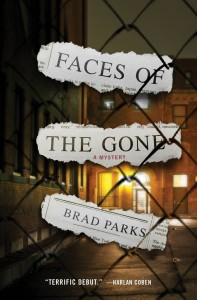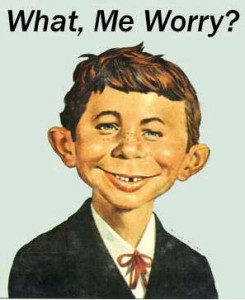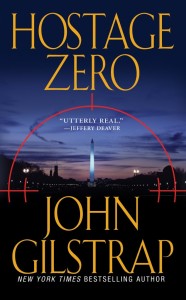By John Gilstrap
I understand that all too often, my hard-earned cynicism shows through, and that I can seem somewhat . . . harsh to people who don’t know me very well. Come to think of it, I might come off as harsh to people who do know me well, also, but I like to think that they grant me the benefit of doubt.
Come Christmastime, though, I become all sappy and tingly. Cynicism makes way for childish optimism.
Our decorations go up the weekend after Thanksgiving, and they stay up through the New Year. The Gilstraps are not competitive decorators, but we’re thorough decorators. In my world, there’s never enough garland or lights. Our Christmas tree is adorned with ornaments from every family vacation, plus two generations of arts and crafts products. My parents’ first treetop ornament has grown too fragile to actually serve atop the tree anymore, but it nonetheless has a prominent place on the kitchen mantle. My son’s favorite Teddy bear from back in the day drives a sleigh that also transports our departed black Labrador retriever’s favorite chew toy.
Are you getting the picture here? Christmas for me is a time for unabashed sentimentality. It’s about loving the people who are in my life, and remembering those who have passed beyond my life. It’s a time when I believe people are nicer to each other. It’s the time of year when Disney-style happy endings always seem possible, if not particularly probable.
It’s with this lightness of heart that I make my daily commute into Washington, DC from my outpost town of Fairfax, Virginia via the Orange Line of the Metro system. I’ve only been a day-job commuter for a little more than four years, but for each of those, I’ve witnessed a Christmas phenomenon that I’ve never seen reported in any of the local news: A nicely-dressed Asian man boards the train at one of the suburban stops, excuses himself, and then sings a Christmas carol to the commuters.
Maybe you need to understand the commuting rules of engagement in Washington, but no one–no one–speaks during the morning commute. We’re very important people in DC, and interruptions are unheard of. Thus, when someone not only sings, but sings of Christmas–the most un-PC of holidays in DC–folks actually get a little nervous. If he had a gun, we’d know what to do; but when he brings a message of cheer, we get flummoxed.
I’ve done a fair amount of singing in my lifetime–both in the shower and out of it–and I know just about every Christmas carol by heart, but even though I’d love to sing along, deep down inside, I’m a coward. Many of my seat mates and aisle mates roll their eyes when they see this unnamed guy. A few giggle. In my gut, I want to go for the Disney Christmas scene where everyone lives inside a musical and no one is embarrassed to belt out the words, but I’ve never grown a big enough pair to give it a shot.
Until this morning.
The mysterious Asian man entered the subway car and started with one of my favorites, “O Little Town of Bethlehem”, and I am proud to announce that I sang along with him. I didn’t mumble, either. I sang full-voice, drawing an annoyed glance from the commuters sitting in front of me. I wish I could report that the entire car was united in song by the time we were finished, but alas, that was not the case. A few people were humming, though, and more than a few gave my guy a hearty “Merry Christmas” as he got off at the next stop.
I admire my mystery man. I appreciate his efforts to bring joy to the hearts of grumpy commuters. If only more people would sing, think how much better their days would become.
What do you think? Could you muster the courage to sing along?
Monthly Archives: December 2009
The Point of it All
The last few weeks have easily been among the most challenging of my writing career. I’ve been on tour, which sounds like great fun until you actually have to spend the greater part of a month away from your family, surviving on granola bars and coffee since events invariably take place at dinnertime and I haven’t yet figured out how to work meals around that.
Plus for the first time I had an event where no one-not one person- showed. I realize that happens to most authors at one point or another, and I’m not claiming to generally draw crowds. But still-it was disheartening.
My publisher announced a new vanity-publishing imprint that caused quite a bit of furor (more on that here). And the ensuing back and forth consumed time and energy that I really couldn’t spare.
Especially since I’ve been juggling the marketing of THE GATEKEEPER while rushing to meet an extremely tight deadline for my next book.
And, for the first time in my writing career, I stalled out.
One of my main characters was trapped in a very dark, hopeless place. And I couldn’t for the life of me figure out how to extricate her from such a desperate situation. Not outlining had suddenly come back to haunt me for the first time. I was fairly certain I’d written myself into a corner.
As I dragged myself out of bed to catch a 6AM flight, it struck me as an apt metaphor. I’d spent years of my living striving to get to this point in my career, and for the first time since signing a writing contract, I wasn’t enjoying it. I know that before I was published, listening to writers whine about their hardships always induced a snort- but there are occasional drawbacks to getting what you want. And as I shuffled through security yet again, it all seemed pointless. I felt trapped by deadlines, tour dates, and all of the ancillary nonsense that sometimes goes on in this industry. I was mired in the same place as my character.
Funny how life works sometimes. I opened my inbox to find this email:
My husband was a fan of yours. He entered one of your contests a year or so ago and won the book “Tunnels”. You autographed the book and it meant a lot to him. He was reading the second book “Boneyard” when he was placed in hospice. He was very sick and he so desperately wanted to finish the book. I tried to read to him but he wanted to read it himself. He never got the chance to finish your book but I just wanted you to know how much he enjoyed them. Thank you for sending the autographed book. I, too, am reading your books and looking forward to next one’s debut, Thank you for making the last months of his life just a bit happier.
I really can’t express how much this email meant to me. It’s easily the nicest thing anyone has ever said about my work-and it’s absolutely more than it deserves. So the next time I find myself descending into that dark place, I have this lovely note to serve as my reminder. I am so very fortunate to be healthy and whole, doing what I’m doing.
The Big Score
By Joe Moore
Over at Murderati, my friend Brett Battles recently blogged about writing while listening to music. Since I’m a big believer in doing it, I thought I’d add my two cents to the topic.
Lets start by looking at the cinema. Arguably, a movie would lose its impact without music. Even in the days of silent movies, there was a live piano player in the theater whose job was to add drama to each scene. You can have the greatest photography, acting, direction, set design and script, but without music, the movie would probably fall flat. Not to be confused with what some call movie soundtracks–usually a collection contemporary tunes–movie scores are written and orchestrated pieces of original music specifically  designed for a particular scene. They enhance and support the visual images. If you listen to a movie score isolated from the visuals, it can verge on being classical in nature. As a matter of fact, I consider names like Trevor Jones, Randy Edelman, Hans Zimmer, Ennio Morricone, James Horner, John Williams, Howard Shore, and many others to be our modern day classical composers.
designed for a particular scene. They enhance and support the visual images. If you listen to a movie score isolated from the visuals, it can verge on being classical in nature. As a matter of fact, I consider names like Trevor Jones, Randy Edelman, Hans Zimmer, Ennio Morricone, James Horner, John Williams, Howard Shore, and many others to be our modern day classical composers.
I discovered many years ago that I could also use the element of music to help me write. Someone gave me the CD score to THE MISSION with Robert De Niro. It happened to be playing on my stereo as I started a new chapter, and I realized that the music set exactly the same mood as the scene on which I was working. So from then on, as I watched movies I would pay particular attention to the scores. If they evoked the type of mood I sought in my WIP, or just set a very cool, dramatic, romantic or spooky mood, I would order the CD and rip it to MP3.
I now have a huge collection of scores on my computer and rarely sit down to write without my MP3 player on “shuffle”. I don’t use any music with lyrics since I find that other people’s words distract me. That’s why scores work so well—in most cases they are instrumental.
So if you’d like to try writing dramatic scenes to music, here’s a short list of my favorite CDs that seem to have it all when it comes to creating a mood found in most mysteries and thrillers.
A Beautiful Mind, James Horner
The Bone Collector, Craig Armstrong
Burn After Reading, Carter Burwell
A Very Long Engagement, Angelo Badalamenti
House of Sand and Fog, James Horner
The Human Stain, Rachel Portman
The Lives of Others, Gabriel Yared
March of the Penguins, Alex Wurman
Runaway Jury, Christopher Young
Amazon lets you sample the tracks before you purchase, so enjoy listening then find the one that fits your WIP.
Do you write to music? Lyrics or instrumental. What are your top five CDs for background music while you write?
A little inspiration is in order
If you’re like me and could use a little inspiration, you should read this wonderful essay about becoming a writer by Alexander Chee. He writes eloquently about the experience of studying writing with novelist Annie Dillard.
After you read it, come back and tell us about your own most important writing teacher. In my case, a creative writing course I took from Robert Pinsky (who later became Poet Laureate) at Wellesley College changed my thinking about writing. I remember how one day he opened a classroom window (on an upper floor) and leaned way, w-a-a-y out of it, to a point that made me nervous; he was showing us that we had to risk discomfort and break out of our Wellesley-refined shells, to dig deep enough to get the stories out. Even though I was focused back then on becoming a journalist (I didn’t think of writing fiction as a “real” career), I still remember the impact that course had on me.
What about you? Which teacher had the most direct influence on you as a writer?
Here be Sharks…
 Please join me in Welcoming guest blogger, BRAD PARKS, to the Killzone…though be warned, treacherous waters lie ahead…
Please join me in Welcoming guest blogger, BRAD PARKS, to the Killzone…though be warned, treacherous waters lie ahead…
 and The (Newark, N.J.) Star-Ledger as a sportswriter and news feature writer. A graduate of Dartmouth College, he is a washed-up jock, a veteran of community theater and a terrible golfer. He lives in Virginia with an understanding wife and two adorable young children. To learn more about Brad or FACES OF THE GONE, visit http://www.bradparksbooks.com/. You can also sign up for his newsletter (http://www.bradparksbooks.com/fan-club.php), become a fan of Brad Parks Books on Facebook (http://www.facebook.com/pages/Brad-Parks-Books/137190195628#) or follow him on Twitter (www.twitter.com/Brad_Parks).
and The (Newark, N.J.) Star-Ledger as a sportswriter and news feature writer. A graduate of Dartmouth College, he is a washed-up jock, a veteran of community theater and a terrible golfer. He lives in Virginia with an understanding wife and two adorable young children. To learn more about Brad or FACES OF THE GONE, visit http://www.bradparksbooks.com/. You can also sign up for his newsletter (http://www.bradparksbooks.com/fan-club.php), become a fan of Brad Parks Books on Facebook (http://www.facebook.com/pages/Brad-Parks-Books/137190195628#) or follow him on Twitter (www.twitter.com/Brad_Parks).What, Writers Worry?
In light of last week’s post about how “bleak” November seemed to many fiction writers, I thought I’d reflect a little on worry. Writers, after all, really have no cause to worry about anything, right?
I mean, putting aside anxiety over whether they’ll ever get an agent, get published, sell enough to stay published, or if they do get published will they get stink bomb reviews; or wondering if they are real writers or only massive frauds, or if they are doing too little self-promotion, or too much; concerns over whether they’re putting undue strain on their marriages or other close relationships; and getting migraines wondering what the future of publishing will look like – discounting all that, writers really have no reason to worry at all.
But, given that some do (I’ve actually met a few of them), I should like to offer two ways to deal with this mental malady: drugs and Bell’s MO (not to be confused with Phillips MO, which offers relief of another kind entirely).
First, drugs. Luckily for writers, pharmaceutical companies have been on the job to develop several treatments for all manner of writerly concerns. Among the most popular are:
Damitol – relieves symptoms associated with wanting to chuck the whole writing thing. Side effects may include cursing, smashing things and inordinate sobbing. Should not be taken by nursing mothers and church deacons.
Agenex – Controls blood pressure when you have to fire your agent. Side effects may include obsession with the number 15.
Bombasic – makes you think you’re charming when drunk (Hemingway reportedly was in a research group for this drug). Side effects may include social opprobrium, intense morning headaches and regret.
Tuborin – alerts you to long sections in your manuscript without conflict.
Promotia – help overcome depression when you discover how much your publisher is paying for marketing.
Noloft – take this if your book fails to make a bestseller list.
Paynaise – Prevents the onset of angst associated with two-figure royalty checks.
Ripitor – normalizes the nervous system after you’ve read a horrible review.
Okay, not everyone is into pharmaceuticals — and recreational drugs are definitely off limits — so I offer an alternative. Call this my own, personal modus operandi for dealing with writer worry. It will work for you if you follow these steps:
1. Take a moment to note the benefits of your worry. You are engaged. You are alive. You have blood coursing through your veins. You are not a chair.
2. Remind yourself of the truth handed down by a wise Jewish carpenter, who once said, “Who by worrying can add one cubit to his span of life?” IOW, worry does absolutely no good regarding future outcomes and you know that. Tell yourself over and over until it sinks in.
3. Now, figure out what’s the worst thing that can happen if you don’t get your desired result. Let’s say you’re waiting to hear about a submission to Penguin. What’s the worst? You get rejected by Penguin. That’s it. (Do not let your imagination run away with you. The very worst thing that can happen is that the acquisitions editor is so angry at your abuse of literature she hires a hit man to take you out. I mean, be reasonable).
4. Next, write down all the ways you can come back strong if the worst thing happens. You got rejected by Penguin. How do you come back from that? You can a) submit elsewhere; b) prepare another project; c) rework the current project according to feedback; d) schedule a talk with your agent; e) study some aspect of the craft you’re weak on. And so forth.
5. After going through steps 3 and 4, tell yourself that you can live with the worst thing. If it happens, it’s not going to debilitate you. It’s not going to stop you. Determine to accept the worst if it happens.
Shameless bonus tip: Read chapters 15 & 16 of The Art of War for Writers, which has more about conquering writer’s worry.
There is still one more step to go, to keep the worry from creeping back up on you. And that is – you know what’s coming –write.
Writing is the best antidote to any worries about writing. When you’re into the page, when the story is coming out, you haven’t got space for any of that anxiety stuff.
Write a short story. Write an opening chapter that you make up on the spot – and see if you have something here that sparks a novel. Write an essay or a diatribe. Start your memoirs. Write a blog entry or well thought out comment for someone else’s blog. Write a character biography.
Do writing exercises, like morning pages. Download Dr. Wicked’s reasonably priced Write or Die program, and then . . . write or die.
Life is too short, and your window for writing too narrow, for you to let worries hang you up. So don’t let them.
Is worry a big problem for you? How do you handle it? Feel free to leave an anonymous comment if you wish to be more open than your public persona is comfortable with.
A Small Change In Genre
By John Ramsey Miller
My oldest grandson, Elijah, started it seven years ago. He had issues with his hearing due to a chronic gathering of fluid in his ears and when he heard his father calling me Pops, it sounded like “Dots.” Since then, each consecutive grand child added to the family has called me Dotz. My sole concession to having that tag for the remainder of my life was to butch up the name by replacing the “s” at the end with a “z.” Now even my children and my wife refer to me as Dotz. I’ve never minded it at all. In fact I sort a like it. The other grandfather is called grandpa Ed, and I bet he’d kill for an actual nickname like Dotz. You can choose a self-aggrandizing nickname for yourself, but those rarely stick.
The grand children love coming out to the place because we have dogs, chickens, frogs, lizards, bugs, a large fire-pit, art supplies, a large field, woods, a motor-driven wheelbarrow, several wagons, a four-wheeler, computers, a toy closet, and their grandmother is always cooking something tasty, which Dotz won’t be allowed to eat because his doctor says so. They can run and play out here without having to worry about traffic, or a lot of the perceived dangers of town. We do have sharp tools, ropes, barbed wire, thorns, grass stains, nettles, exposed tree roots, holes, poison oak and ivy, falling satellite debris, and the possibility of an occasional Copperhead, Black Widow spiders, and rabid animals wandering onto the property.
My 4-year-old granddaughter spent the weekend at our ten-acre mini-farm. There are always chores to perform out in the boonies, and I had dropped some trees a few weeks back so it was time to cut them up for winter fires since cold weather was fast approaching. Sasha was complaining because all we do is work, so I piled my chainsaw and splitting tools into my motor-driven wheelbarrow, and put her up into the bed and took off through the woods.
When we got to the trees, I trimmed the limbs off and started cutting the trunks into sections that would fit into the stove. Sasha loved the ride and as I started cutting, she watched from the wheelbarrow.
Then my wife asked me to cut kindling and I cut the limbs up. Then while I was cutting the trunk, my wife had Sasha help her load the wheelbarrow with smaller logs, and Sasha accompanied the wheelbarrow to where we were stacking wood and helped her grandmother stack it. Sasha helped until we were done, smiling all the while. I realized that my grandchildren all get involved with chores like gathering eggs and feeding chickens and a million little things we have to do to stay above the water, so to speak. And I thought about how mush they enjoy being with us and what they are learning. It’s giving them a boost to their self-images, and perhaps even more important than playing video games or watching TV.
So I’ve been setting aside part of my days to work on children’s stories based on my personal experiences with my grandchildren and the lessons we learn on this mini-farm. These stories are a bit different that the usual stories for children. These are a few of the “Farm Fun With Dotz” titles:
“Gathering Eggs With Dotz” or “Eggs are not baseballs, Little Rush.”
“Wild Creatures On Dotz’s Farm” or “This is why we never pick up snakes.”
“Being Gentle With The Farm Babies” or “Dotz is going to teach you how to use a shovel.”
“The Rooster Has Spurs” or “First Aid on the Farm.”
I like writing simple sentences and books that are just a few pages long. But writing for children isn’t as uncomplicated as you’d think since the lessons have to be positive, and it’s so easy to warp young minds. Telling children stories isn’t nearly as easy as writing thrillers. Don’t take my word for it, give it a try. You might just write the next CHARLIE AND THE UNFORTUNATE CHAINSAW INCIDENT.
Ever thought about going cross-genre into something totally different?
A New Cover For The New Year
by John Gilstrap
http://www.johngilstrap.com/
When my new book, Hostage Zero, is released next July, it will mark my 7th time going through this process, and I confess that it continues to amaze me every single time. I start with the nugget of an idea, and then nurture it into a concept and from there into an outline. When it looks like something that can sustain itself as a whole story, I take that deep breath and start filling up the page.
Man, those first few chapters really fly. Look, ma! I’m a real writer! I’m freaking brilliant! Jeeze, why isn’t every book this easy? Then I read what I’ve written.
Uh-oh. Who the hell wrote those sentences? They suck. They’re all clunky and awkward. Grammar, anyone?
So the rewrite of that first section begins, and as the layers of polish begin to show a shine, I begin to believe that maybe some smattering of talent remains. Sure, I can do this.
Then, halfway through the second act, I begin to think that I might have chosen the wrong story to write. Why would the characters do what I’m having them do? Jesus, nobody talks like that in real life. Oh, for crying out loud, that character needs to know how to shoot, but I’ve already mentioned three times that he’s never held a gun. Time to re-rewrite the front of the book.
At last, there’s the ending. I know it’s the ending because I actually wrote those magic words, “The End.” But I can’t end it there. It’s flat. Nobody wants to read a book with a flat ending. Time to re-rewrite the back of the book.
Meanwhile, my deadline has come and gone. I’m late on delivery. I read the book through, from beginning to end, making edits along the way, but you know what? It seems good now. But do think that because I really think it, or because I’m past my deadline and I have to think it? Only one way to know for sure. I attach it to an email to my editor and I click “Send.”
Then I wait. And wait.
Then I get the call. The editor loves the book! I mean, really loves it. She tells me great things, and I relax, hoping–praying–that I end up with a cover that will actually help sell the book. (We’ve discussed here before that some covers kill books before they’ve had a chance to thrive.) My editor tells me that the art department is working on a great concept, but every art department tells every author that same thing. Please, Lord, get me a good cover.
Then I see it. Wow. I love it. But do I really love it, or is that torpedo already in the water and I have to love it. What do y’all think?
WORK THOSE L’IL DOGGIES
by Simon Wood
Today TKZ is thrilled to welcome Simon Wood, a darn good writer who I was fortunate enough to tour with last summer (I can still recite his “one time I literally ran into an assassin” story by heart). He shares a unique take on what we’ve been discussing quite a bit lately, creative ways for authors to earn a living in the digital age.
The writing world is an odd industry, but no different from any other. I think writers sometimes forget that our stories are commodities. A writer’s body of work doesn’t lose its value. Therefore, stories should be worked for all they’re worth.
I didn’t look at my work this way until I heard science fiction and fantasy legend Gene Wolfe speak at a convention a few years ago where he was the guest of honor. He was talking about how he’s always made his stories work for him. A good story doesn’t have to end its life at its first printing. Like Halley’s Comet, it can keep coming back again and again for the enjoyment of a new audience. He’d calculated how much some of his stories had earned for him. A number of his stories had earned several dollars per word. Admittedly, it had taken a couple of decades to do that. Nevertheless, that was pretty amazing.
This was quite a revelation to me. I took to heart what Gene had said. I’d had a handful of stories published so far, most earning a couple of cents per word on average. I looked at my body of work and found ways of getting my stories published and re-published. Stories I sold to print markets I resold to webzines. I looked to foreign language markets where the story would be fresh. Within a couple of years, I’d resold some of my stories three times over.
While I still have a couple of stories reprinted every year, with print markets shrinking and most other markets looking for unpublished fiction, I turned to the internet. A few years ago, I discovered Fictionwise.com. They were only interested in previously published fiction. They operate on a similar platform as iTunes where users downloaded stories like people do with songs. It’s worked out very nicely. My stories are still available and their popularity is determined by the readers.
I’m now taking this approach with my books that are going out of print. I like to think there’s a demand for these books. Maybe not enough for a re-issue, but there’s certainly more than enough for e-publishing. The likes of Amazon’s Kindle and Smashwords.com have made it easy for me to keep my books out there and meet a demand. I’ve recently e-published DRAGGED INTO DARKNESS and WORKING STIFFS, two books of mine that I believe contain good work.
This is where a little discretion comes in too. I’m only republishing things that people ask about or that I can hand-on-heart say represent my best writing. There’s no point in me putting out things that are subpar. And I’ll be honest. There’s stories of mine that got published, especially in the early years, which I look upon as amateurish now and while I’m not ashamed of those stories I don’t feel they represent what I write now. I could be a total reprint slut and toss everything I’ve ever written at the eBook reader but it’s not worth it. There’s a massive pinball effect with a writer’s work. Someone reads a story and like it, so they check out something else I’ve written. That only works if what is out there is good. If it’s bad, it has the converse effect and they’re unlikely to seek out other works.
I view eBooks as another weapon in my publishing arsenal and not a threat to it. That’s why I’m also going to explore the e-publishing route for some stories that I’ve been sitting on that don’t fall into traditional print publishing options such as novellas and novelettes. There’s certainly an opportunity for me to experiment.
So how has working my stories hard fared for me? Not as well as it has for Gene Wolfe, but I’m getting there. Several of my stories have been picked up for different anthologies and have earned me two and three times what I was originally paid for the piece. One story, TRAFFIC SCHOOL, was published three times, each time earning pro-rates, before I put it on Fictionwise and there, it has found a following. It’s by far my bestselling story by a factor of at least two to one. I think this creepy little short about bad driving habits will be my little goldmine. My work for Writer’s Digest has done well too. A couple of the pieces have been reused two and three times and have earned four-digit paydays. I’ve now placed them on Smashwords.com and I’ll see how they work out there.
At the end of the day, as long as there are readers, stories are commodities that don’t diminish with age or time and the electronic option is helping there. And that’s all good as far as I’m concerned.
Learn more about Simon at www.simonwood.net and his work at:
Kindle Store
Smashwords.com
Fictionwise.com
Conjugating Verbs
By Joe Moore
Each week, all the Kill Zone authors fly to a Denny’s in Wichita (chosen because of its central location) for a breakfast meeting to plan our upcoming blog posts. Some of us lean toward topics about life and how we equate it to our stories while others gravitate toward the mechanics of writing. There’s usually a smattering of rants, and of course we can count on Miller to have some great tales about his free-range chickens. It gives us an opportunity to chat while enjoying a tasty Grand Slam breakfast that’s always fresh and fruity.
 At last week’s meeting, we realized that not only were we running out of 2009, we were also running out of new ideas to blog about. We agreed that we needed a break to recharge the portion of our brains devoted to posting at TKZ. We made the executive decision to repeat what we did last year and take two weeks off for Winter Break. So from Monday, December 21 until Sunday, January 3, the Kill Zone blog will be closed for the Holidays. That doesn’t mean we won’t be hard at work thinking up new and exciting topics for 2010. As a matter of fact, next year we will be announcing two really brilliant ideas in which all of you can participate. One involves the combined creative efforts of your seven Kill Zone bloggers and the other will involve all you writers out there. The end result of both should be very cool. So stay tuned to TKZ for two unique and (as far as I know) original ideas.
At last week’s meeting, we realized that not only were we running out of 2009, we were also running out of new ideas to blog about. We agreed that we needed a break to recharge the portion of our brains devoted to posting at TKZ. We made the executive decision to repeat what we did last year and take two weeks off for Winter Break. So from Monday, December 21 until Sunday, January 3, the Kill Zone blog will be closed for the Holidays. That doesn’t mean we won’t be hard at work thinking up new and exciting topics for 2010. As a matter of fact, next year we will be announcing two really brilliant ideas in which all of you can participate. One involves the combined creative efforts of your seven Kill Zone bloggers and the other will involve all you writers out there. The end result of both should be very cool. So stay tuned to TKZ for two unique and (as far as I know) original ideas.
At this point, I bet you’re wondering why this post is called Conjugating Verbs? Well, just as the waitress was bringing my second helping of Silver Dollar pancakes, which I like with the strawberry flavored syrup, I declared to my fellow bloggers that I was so out of ideas, my next post would be about conjugating verbs. So here goes. This is my most cherished and only memory from four years of high school Latin: Amo, Amas, Amat.




